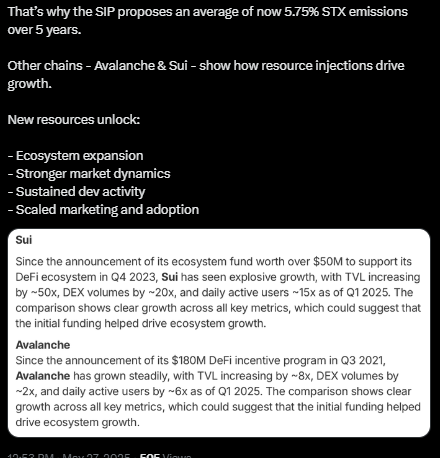In the realm of blockchain technology, we must remain vigilant against the encroachment of collectivist ideologies that threaten the sanctity of individual rights and the predictability of economic systems. The recent discussions within the STX community regarding potential alterations to the monetary policy—such as increasing or decreasing block rewards, postponing halvenings, or modifying emission schedules—underscore a dangerous flirtation with democratic governance over foundational economic principles.
Consider the proposal to delay the upcoming halving scheduled for January 2025. Such a move, if subjected to majority vote, opens the door to arbitrary changes in the emission schedule, thereby undermining the very predictability that engenders trust in the system. The allure of democracy in this context is a siren’s call, tempting us toward decisions that may serve short-term interests but ultimately erode the long-term stability of the network.
Bitcoin has demonstrated the power of immutable monetary policy. It is not governed by shifting majorities but by an unchangeable economic framework that ensures predictability. This is why Bitcoin is trusted: because its rules are not up for debate. The moment governance is allowed to interfere with STX’s core economic rules, the network ceases to be a reliable store of value and instead becomes a bureaucratic playground, no different from the fiat systems we sought to escape.
A blockchain must not be a democracy; it must be a constitutional republic. In real life, constitutions exist to limit government power and protect the individual’s life, liberty, and property from the whims of the collective. In blockchain, no one’s life is at stake, but property rights are. Just as a government must not have the power to arbitrarily seize or devalue an individual’s wealth, a blockchain’s governance system must not have the power to manipulate monetary policy for the benefit of the majority at the expense of the individual.
As Leonard Peikoff wrote, “The American system is a constitutionally limited republic, not a democracy, restricted to the protection of individual rights. The majority has no say over the basic principles governing the government.” In the context of blockchain, this translates to a system where the core economic rules are inviolable, shielded from the caprices of majority decision-making.
To preserve the integrity of STX, we must establish a constitutional framework that explicitly prohibits governance from altering monetary policy. This constitution would serve as a bulwark against the tyranny of the majority, ensuring that the foundational economic parameters remain sacrosanct and beyond the reach of collective interference.
In conclusion, let us heed the lessons of history and the principles of individualism that underpin the very philosophy of decentralized systems. By enshrining an immutable monetary policy within a constitutional framework, we safeguard the predictability and trust that are essential to the enduring success of STX. Let us commit to building a Blockchain Republic, where governance exists to protect, not to plunder, the rights of the individual.

